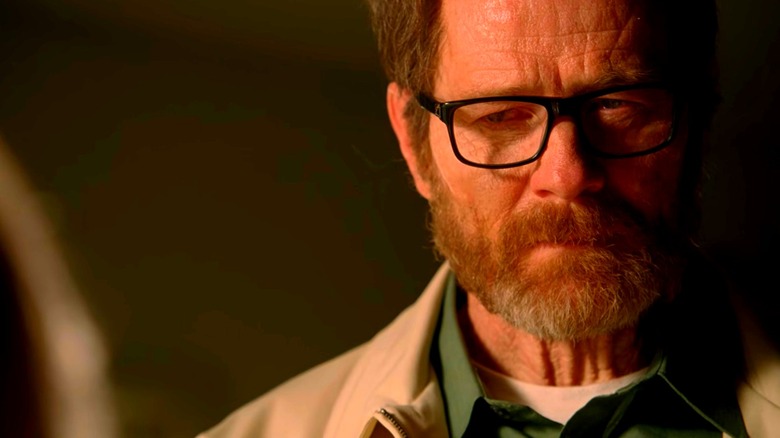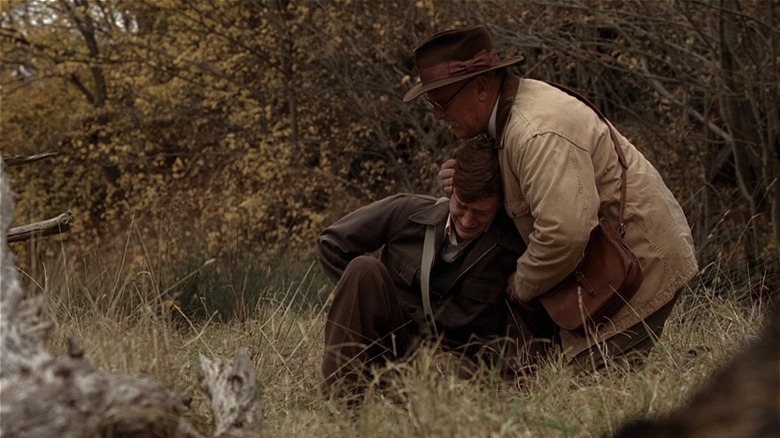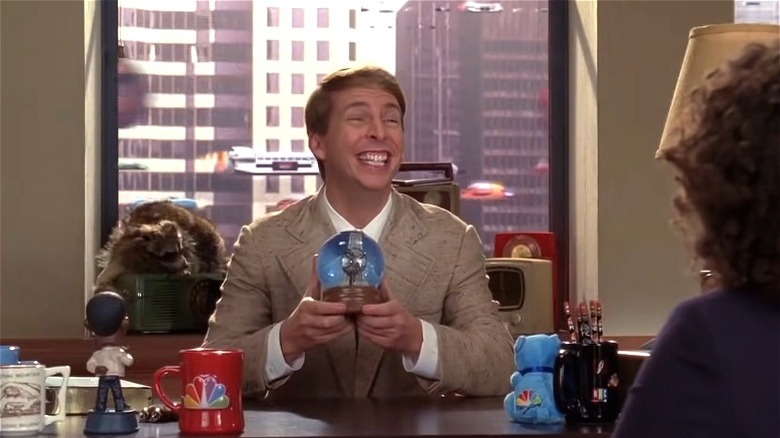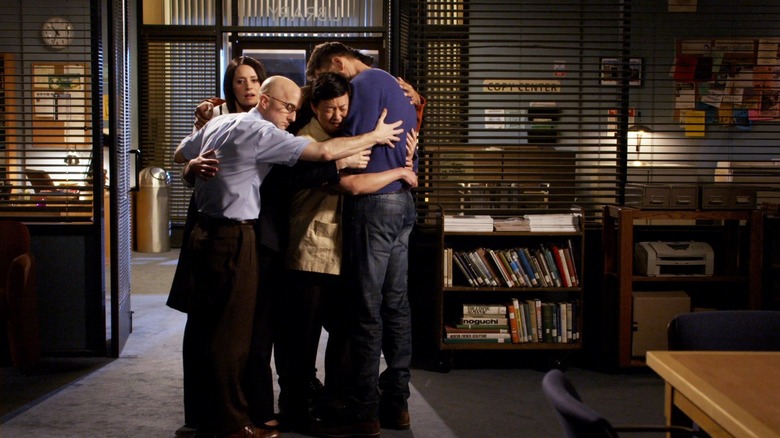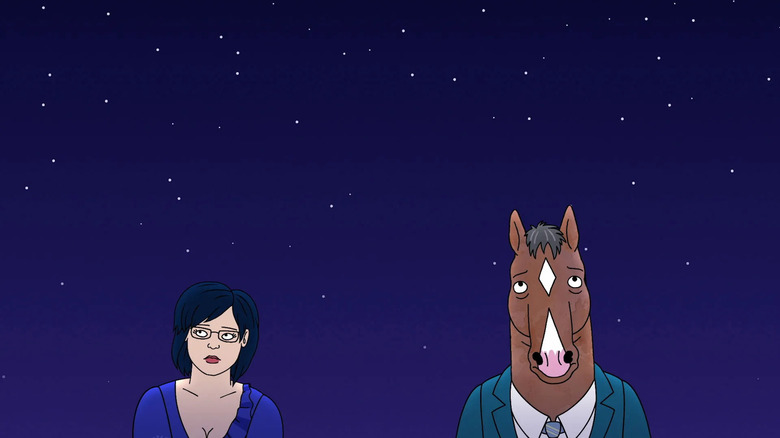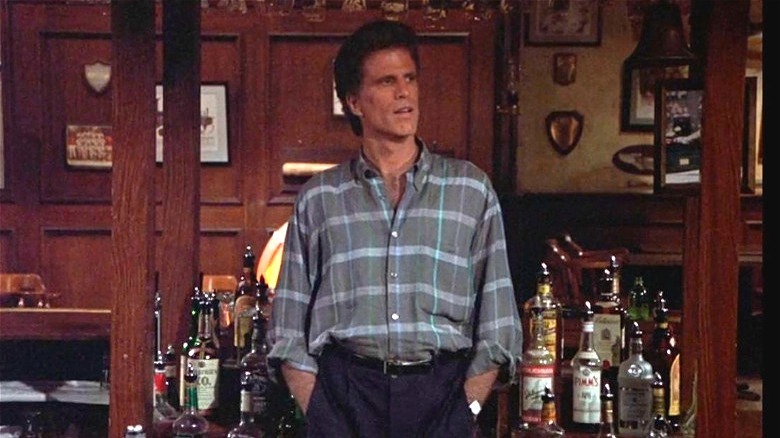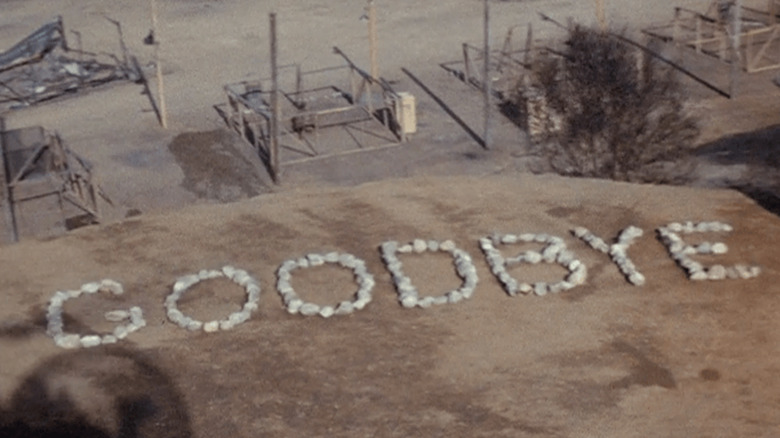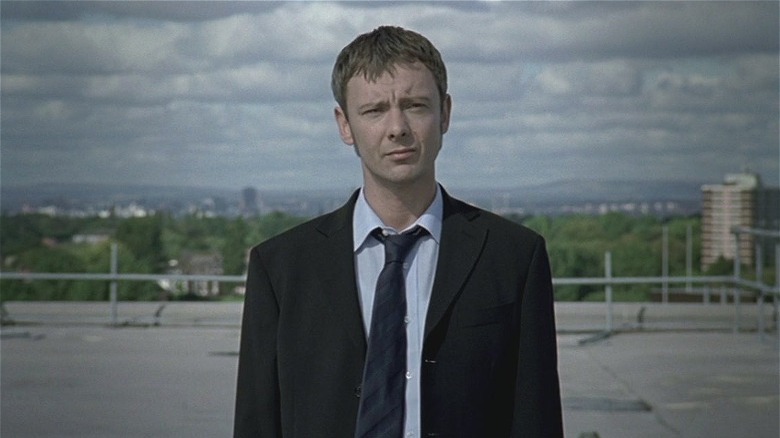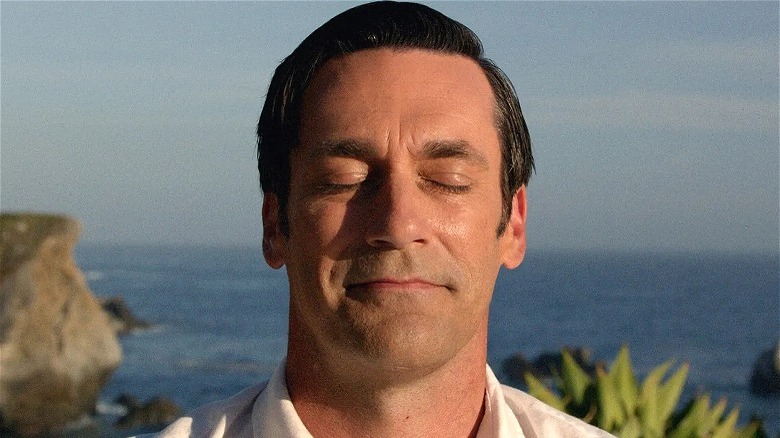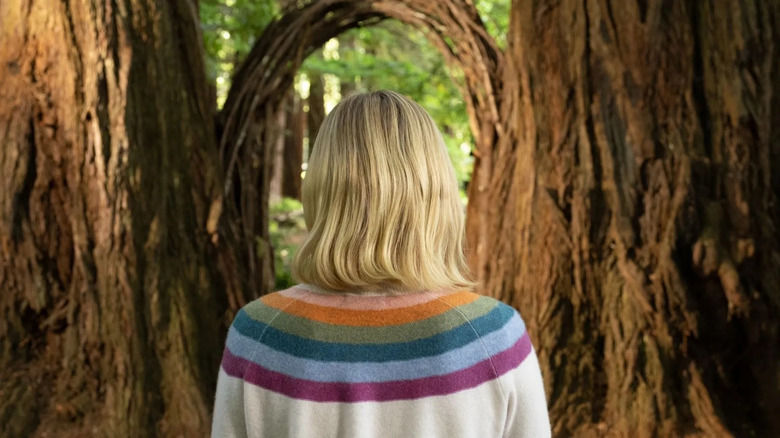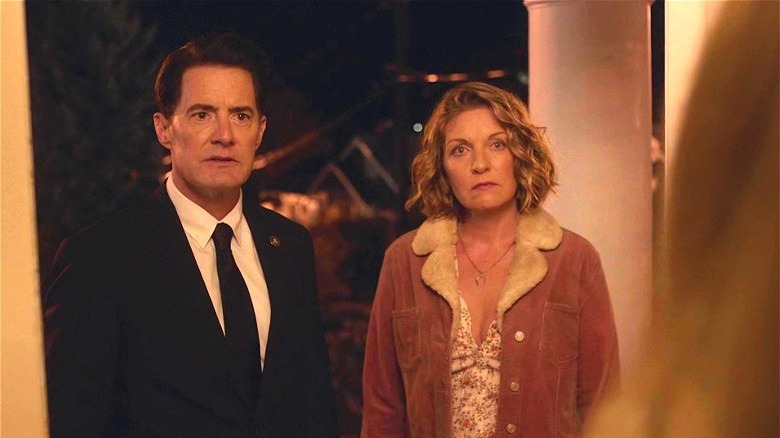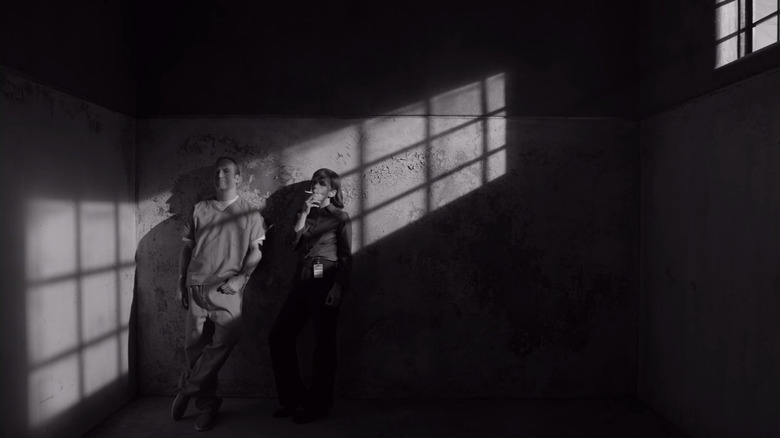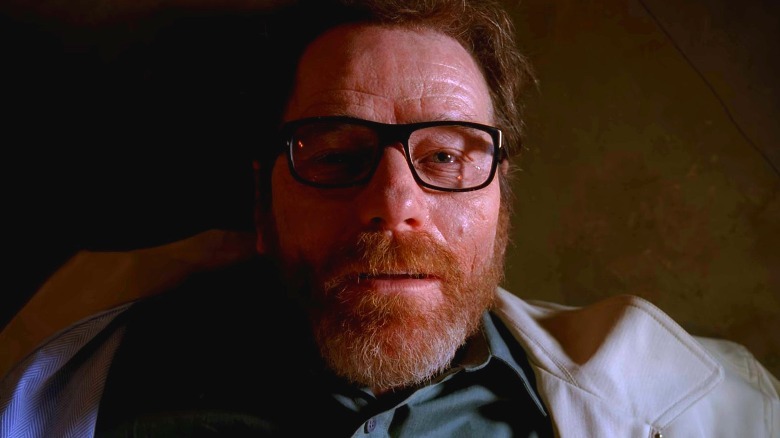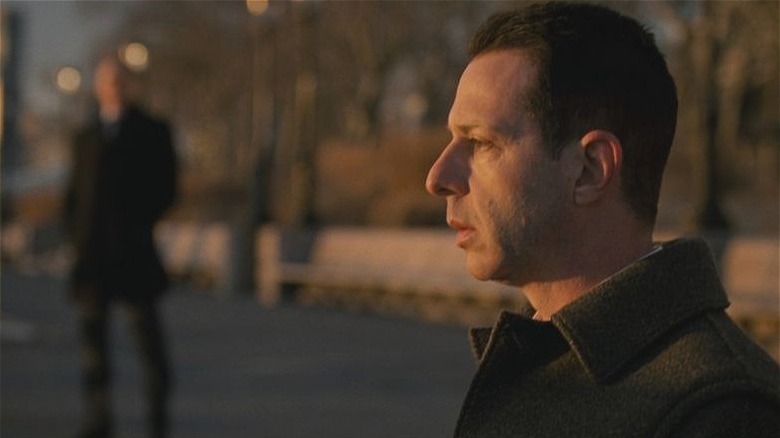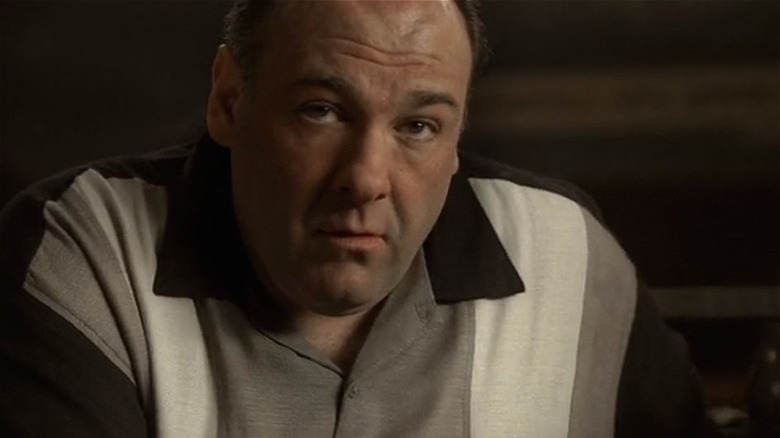The 14 Best TV Series Finales Of All Time
A story is only as good as its ending. This goes for any form of narrative art, of course — film, literature, video games, whatever — but it rings especially true for television. TV shows tell vast, complex stories across multiple episodes and seasons, meaning audiences must invest a significant amount of time and energy in order to fully enjoy them. If a series can't stick the landing, then you can't help but feel a little cheated. All that, for this?
On the other hand, a successful finale accentuates a show's finest qualities, delivering catharsis, heartbreak, and satisfaction in abundance — even if you're left wanting more. It also acts as more than a mere episode, touching on the story's themes, rounding off character arcs, and tying up any loose ends. In short, finales ain't easy. In the right hands, though, they can stand out as the very best episodes in a show's run; in some cases, they're counted among the greatest moments in television history. Need proof? Here are the best TV series finales of all time.
The Pacific
Despite boasting a stellar cast, strong writing, and some of the most visceral battle scenes ever put to screen, Tom Hanks and Steven Spielberg's HBO miniseries "The Pacific" has gone largely forgotten in the grand pantheon of blockbuster war stories. Many viewers' initial disappointment with "The Pacific" seems rooted in the fact that it's nothing at all like "Band of Brothers." For one thing, it's much darker than its predecessor, focusing more on the horrors of war than the heroics.
This proves especially notable in "Part Ten," the show's final episode, which takes pains to remind you that the scars of war linger long past the victory celebrations. In the absence of John Basilone (Jon Seda), who died a few episodes earlier, his third of the narrative switches to his widow, Lena (Annie Parisse), as she meets and mourns with her husband's family. Meanwhile, Eugene Sledge (Joseph Mazzello) fulfills his father's fears after returning from Okinawa, succumbing to endless night terrors and — in arguably the show's most devastating scene — finally breaking down on a hunting trip. These quieter moments mark an effective contrast to the fireworks of the previous episodes but also work in tandem with them to impart the brutal message at the heart of the series.
Fans may not remember it as fondly as "Band of Brothers," but "The Pacific" deserves credit for taking the road less traveled, eschewing the gung-ho patriotism found in so many other WWII movies and shows for a much more meaningful ending.
30 Rock
"Last Lunch," the 138th and final episode of Tina Fey's manic comedy series "30 Rock," warrants a place on this list because, unlike so many of its sitcom peers, it remains truly hilarious right up until the very end.
Honestly, what's not to love? You've got Tracy (Tracy Morgan) wreaking havoc on "TGS" in an attempt to stop the final episode from going ahead; Jenna (Jane Krakowski) belting out an all-time performance of a song from "The Rural Juror" that simply must be seen to be believed; Jack (Alec Baldwin) nearly faking his death until he concocts an idea for translucent dishwashers and immediately changes his mind; and Liz Lemon (Tina Fey) in the midst of it all, bounding down the line between heart and humor that many sitcom characters are barely able to walk. The jokes are fresh, the performances as glorious and chaotic as ever — how many other shows can say that after seven seasons?
And then there's the epilogue, which, with its heartwarming-yet-sly glimpses into the future, almost feels like a prescient refutation of the sickly-sweet ending barfed out by "Parks & Recreation" two years later. The episode caps off with the phenomenal reveal that Kenneth (Jack McBrayer) is not only immortal but also destined to one day produce a show about the adventures of Liz Lemon. It's just too good. We'll never forget you, Rural Juror ... and we'll never forget you either, "30 Rock."
Community
Even diehard "Community" fans occasionally find it difficult to jive with the show's sixth season. NBC canceled the original run of the beloved Dan Harmon sitcom after the end of Season 5, only for Yahoo! to bring it back on their ill-fated streaming platform, Yahoo! Screen. It soon became clear that Yahoo! let the showrunner off the leash for Season 6, as the entire season is pretty much wall-to-wall Spanish Gremlins, VR, and gigantic hands. Basically, it's weird as hell.
"Emotional Consequences of Broadcast Television" does a grand job of balancing that weirdness with the show's knack for sentiment, all without losing sight of what "Community" is about: a bunch of imperfect losers finding family in each other. The episode sees each character offer their own pitch for "Season 7," or their next year at Greendale Community College. These range from the genuinely brilliant, such as Chang's (Ken Jeong) idea to introduce a new stop-motion friend named Ice Cube Head, to the outright depressing — Jeff's (Joel McHale) greatest fear, for example, involves a revolving door of B-list characters ushering the "show" into mediocre perpetuity.
In the end, "Community" refuses the easy option. Some characters stay, others leave, and the show comes to an end, but the love and kindness shared among the study group eclipse the grief of its near-dissolution. Indeed, the episode's best moments, such as Jeff's double hug with Abed (Danny Pudi), come from it. And that's what "Emotional Consequences of Broadcast Television" does so well: It tells you to move on, shows you how, and reminds you why you must.
That said: #andamovie.
BoJack Horseman
In the lead-up to the debut of Season 6 of "BoJack Horseman," fans ran amok with theories about how the equine thespian's story might end. More than a few suggested that BoJack (Will Arnett) would take his own life in the final episode, likely because they believed that a show known for its adult themes and cynical overtones demanded a downright depressing ending. Luckily, they were wrong.
In "Nice While It Lasted," BoJack attends Princess Carolyn's (Amy Sedaris) wedding while on furlough from prison, and the episode essentially grants him a carousel of sweet — or bittersweet — moments with his old friends and acquaintances. Surprisingly, it's Todd (Aaron Paul) who best sums up the meaning of "Nice While It Lasted," and perhaps even "BoJack Horseman" itself: When BoJack explains that the routine of prison could help him break his sobriety record and worries about relapsing afterward, Todd tells him: "After that, you'll beat your record again. Every day, you'll set a new record."
That's what "BoJack Horseman" really says beneath the bleakness and humor: Everyone is flawed, but we can get better if we try. As the jogging baboon notes at the end of Season 2, "Every day it gets a little easier. But you gotta do it every day. That's the hard part." More than anything, "Nice While It Lasted" rates as a superb demonstration of this optimism, which sits right at the heart of this show. Sure, it's a little tough to see — but you'll find it if you look.
Cheers
"One for the Road," the final episode of "Cheers," might well be one of the most influential TV finales ever made. This 90-minute goodbye practically distills the very essence of the sitcom exit into a single episode: There's a proposal, a misunderstanding, a shocking comeback, a farcical mix-up, a few job offers and promotions, another proposal, and a final, touching scene in the show's central location. It might all seem cliché nowadays, but the tropes and story beats "Cheers" laid down in 1993 have been referenced, parodied, and lifted by dozens of shows over the years, from "Friends" to "Scrubs" to "Ted Lasso."
While much happens in "One for the Road," it's really worth highlighting that final scene. Sam (Ted Danson), having decided against eloping to Los Angeles with Diane Chambers (Shelley Long), returns to Cheers. By the end of the night, only he and Norm (George Wendt) remain in the bar. Norm tells Sam that he knew he'd always return for his "one true love" and leaves Sam alone. After realizing that he's the "luckiest son of a b–ch on Earth," Sam wanders around his beloved bar, straightens a picture of Geronimo on the wall, and departs down the hallway from which he first appeared in the show's pilot. Again, this all might sound a little cute, but the last scene in "Cheers" nailed this kind of ending far better than its few predecessors and many successors. Even today, you can feel 11 seasons of emotional weight in Ted's last walk around Cheers, the same weight felt by 93 million people back in 1993. Talk about an all-timer.
M*A*S*H
Of course, even the staggering audience numbers enjoyed by "Cheers" for its finale pale in comparison to the "M*A*S*H." goodbye. In 1983, the iconic comedy-drama series aired its two-hour finale to an almost unbelievable 106 million people (about 45% of the U.S. population at the time), setting a viewership record for an episodic series that has never been beaten.
"Goodbye, Farewell and Amen" lives up to its reputation too. More a TV movie than an episode, per se, the story follows Hawkeye Pierce (Alan Alda) and the rest of the staff of the 4077th MASH as they celebrate, and cope with, the end of the Korean War. A tragic vein runs through the episode from beginning to end, and at its darkest — the infamous chicken reveal, for example, or, the fate of Charles' (David Ogden Stiers) musicians — it's as affecting as any war movie. But "Goodbye, Farewell and Amen" also serves as a wonderful send-off for the characters we've come to love so much over the previous 11 seasons: that final party, in particular, ties a neat bow on each character's arc and allows each to leave the show in their own meaningful manner. The series closes out on B.J.'s (Mike Farrell) final farewell to Hawkeye, a genuinely beautiful moment that has rightfully gone down in TV legend. A hell of a lot of people saw that goodbye play out all those years ago, and it's hard to imagine many of them — or any of them — were disappointed.
Life on Mars
The supernatural police procedural "Life on Mars" tells the story of Sam Tyler (John Simm), a straight-laced detective who, after being struck by a car in 2006, wakes up in 1973. As Sam attempts to figure out what the hell has happened to him — is he mad, in a coma, back in time? — he must reckon with the Wild West tactics of his new superior, DCI Gene Hunt (Philip Glenister).
In "Episode 8," Sam agrees to betray Gene and the rest of his team in order to cut out the "cancer" in Manchester's police force and go back home. He succeeds, and by the episode's final act has returned to 2006. But his friends from 1973 are gone, the by-the-book methods of modern cops bore him, and he doesn't even feel the pain when he accidentally cuts his finger. Sam's home, but he's barely living. So he climbs to the roof of the police station and, as David Bowie's "Life on Mars" rings out, throws himself off. He returns to the past, rescues his colleagues from a train robbery shootout, gets the girl, and rides off into the sunset.
The "Life on Mars" finale works for a number of reasons. Aside from featuring an outstanding performance by John Simm, "Episode 8" refuses to explicitly answer any questions and instead focuses on the emotional journey on which we have embarked over the last two seasons. This strange, backward world inhabited by Gene Hunt feels less scary and more like home with every passing episode, and by the end you're almost screaming at Sam, begging him to stay. In the end, he does — and while you're not exactly sure what has really happened, that doesn't make the return to '73 feel any less glorious.
Mad Men
It's a little surprising how "Person to Person," the final episode of the period drama "Mad Men," so generously doles out happy endings. This show compels its characters to wrap up and sell the human experience to consumers, to make a damaged world look pretty. Perhaps it shouldn't be a shock that a story about advertising — about capitalism, in many ways — can be so deeply cynical; hell, even Don Draper (Jon Hamm) himself is, essentially, a living lie. And yet, at first glance, "Person to Person" is anything but.
Despite Betty's (January Jones) terminal cancer diagnosis, Sally (Kiernan Shipka) steps up to take care of her brothers. Peggy (Elisabeth Moss) finds love with Stan (Jay R. Ferguson) and continues to rise through the ranks at McCann Erickson. Roger (John Slattery) accepts his mortality and Joan (Christina Hendricks) establishes her own business. Even Pete Campbell (Vincent Kartheiser) escapes New York, heading out to Wichita with his family in tow. So far, so saccharine, right?
Here's the thing, though: In "Mad Men," even a happy ending is worth selling. The final scene, in which Don comes up with the idea for Coca-Cola's iconic 1971 "Hilltop" ad campaign while shortly after breaking down on a spiritual retreat in California, exemplifies the show's uneasy dichotomy: There's the human experience, and there's the product. The implication that Don took his moment of nirvana and used it to sell soda makes for one of the greatest rug-pulls in TV history, and it's only improved by the hour of television leading up to it. Even as the credits roll, you just can't help but wonder: What have we been sold?
The Good Place
How do you close the door on a show about dead people? By killing them all over again, of course. Across four seasons, the fantasy/comedy/philosophical sitcom "The Good Place" takes Eleanor (Kristen Bell), Chidi (William Jackson Harper), Tahani (Jameela Jamil), and Jason (Manny Jacinto) on a literal descent into Hell as they attempt to figure out what went wrong with the afterlife. By the show's final episode, the new system — designed by the four mortals and Michael (Ted Danson), their reformed demon-friend — is in full swing, and life in the Good Place is good ... too good, in fact. So, to overcome the ennui inspired by the prospect of a perfect eternity, Michael creates a door through which souls can exit when they're ready to depart the afterlife for good. In "Whenever You're Ready," each of the show's lead characters decides to walk through that door.
So, yeah, obviously there's a lot of heartbreak here, since "The Good Place" finishes by essentially "killing" its cast of loveable misfits. But any show can mine emotion from a character's death. "Whenever You're Ready" stands out because it takes such an intelligent and meaningful approach to the end of existence; Chidi's speech during his last evening with Eleanor, in particular, blends a thoughtful take on Buddhist philosophy with some of the last decade's best sitcom writing, delivering a touching and life-affirming farewell to both the characters and the show. That's the brilliance of "The Good Place" — you may not want it to end, but, by the time the wave returns to the ocean, you're ready to let it go.
Twin Peaks: The Return
"Twin Peaks" plumbed new depths of surrealist horror for its long-awaited third season, gradually unfolding over 18 bizarre, beautiful, and nightmarish episodes that comprise what was also called "Twin Peak: The Return."
"Part 18" begins shortly after Agent Cooper (Kyle MacLachlan) loses Laura Palmer (Sheryl Lee) during his attempt to rescue her from a grisly death in 1989. After a brief trip to the Black Lodge, Cooper appears to journey to another world, where he runs into Carrie, a girl who looks suspiciously like Laura. He decides to take her back to Twin Peaks, but, when they arrive, a stranger answers the door of the Palmers' home; as they leave, a confused Cooper asks: "What year is this?" Then, in the darkness, Laura's mother (Grace Zabriskie) calls her name, "Carrie" lets out the scream to end all screams, and all the lights cut out. And that's the end of "Twin Peaks."
In 1990, David Lynch told a Los Angeles Times reporter that "Twin Peaks" demanded better than an easy resolution. "As soon as a show has a sense of closure," he said, "it gives you an excuse to forget you've seen the damn thing." Time, it seems, did not change his mind, as "Part 18" leaves you quite literally in the dark about the fate of Cooper and Laura, suggesting that the battle for Laura's soul will likely rage on long after that cut to black. Is it satisfying? No. But while "Part 18" refuses to provide the closure some fans might have wanted, Lynch's decision to deny his masterpiece an easy ending means that nobody will forget it in a hurry.
Better Call Saul
It's hard to believe that, a long time ago, many "Breaking Bad" fans were anything but impressed with AMC's announcement of a Saul Goodman spin-off series. Really? The lawyer guy? Surely other characters would be better-suited to exploration. Could Saul Goodman really carry multiple seasons of a prestige TV show?
As it turned out: yes. For seven years, "Better Call Saul" ruled the television roost, blowing its competition out of the water in practically every possible way: writing, direction, acting, and cinematography. You name it, "Saul" nailed it. And you could make a solid case to argue that "Saul Gone," the series finale, marked the finest hour in the show's best season.
Set after the events of "Breaking Bad," the finale follows Jimmy McGill's (Bob Odenkirk) journey through the other side of the legal system, as he faces justice for his part in Walter White's (Bryan Cranston) meth empire. Despite scoring the chance to enjoy a cushy seven-year sentence in a low-security prison, however, Jimmy decides to break free of his Saul Goodman persona, admits to and atones for his crimes, and reunites with Kim Wexler (Rhea Seehorn). It's an immensely satisfying ending for a character whose complexities we couldn't possibly comprehend back in 2009, one that simultaneously provides closure to the world of "Breaking Bad" and fulfills the series' potential as the ultimate redemption story. Props to Odenkirk himself, too, for delivering a show-stopping final performance, tying the bow on a portrayal that will no doubt go down in television legend.
Breaking Bad
"Better Call Saul" may have ended with a moment of quiet redemption, but "Breaking Bad" went out with a bang. "Felina," the finale of the wildly successful crime series, finds Walter White setting out to rescue Jesse (Aaron Paul) from the clutches of Jack Welker's (Michael Bowen) neo-Nazis, while also bidding farewell to his family and tying up the loose ends of his criminal enterprise. After mowing down the Nazis with a remote control machine gun, Walt frees Jesse and takes a final walk through a meth lab before succumbing to his wounds, a slight smile on his face.
There's something incredibly empowering about Walt's last stand. While the show's sequel series acts as a kind of 21st-century morality play, "Breaking Bad" affords its criminal protagonist a stirring victory against his foes — not just the Nazis, but also the police, Lydia (Laura Fraser), and his old business partners, Elliot (Adam Godley) and Gretchen (Jessica Hecht). Perhaps most importantly, he actually achieves the goal set out by the very first episode, setting up his family with enough money to take care of themselves after his death. Obviously, "Felina" leaves some dubious moral questions behind, especially considering a whole ton of people got murdered along the way, but Walt's triumph plays out with such punch-the-air brilliance that you can't help but root for him, right up until the very end. With villains like these, who needs heroes?
Succession
Amid boundless misery, trauma, and corporate drama, "With Open Eyes," the last episode in HBO's near-flawless black comedy "Succession," allows for one brief period of respite. At their mother's vacation residence in Barbados, Kendall (Jeremy Strong), Shiv (Sarah Snook), and Roman (Kieran Culkin) participate in a drunken midnight coronation, dousing Kendall in a hideous "smoothie" concoction after deciding to back him to become CEO of Waystar RoyCo. It's a rare and pleasant glimpse into the last dregs of humanity that remain in the Roy siblings, one that no doubt warmed the hearts of fans who spent four seasons with them. But it also hurts to watch, because you just know that everything is going to fall apart before too long.
Sure enough, the tragedy of "With Open Eyes" rears its ugly head during one last boardroom showdown, in which Shiv changes her mind and refuses to vote against the company's acquisition, allowing it to fall into the hands of Lukas Matsson (Alexander Skarsgård) and Tom Wambsgans (Matthew Macfadyen). The series' final scene with the three siblings acts as a kind of antithesis to Kendall's coronation, unflinchingly tearing the Roys apart once more and ending with Roman's summation of the whole show's ethos: that he, his family, and the company itself are all "bulls–t." It's remarkable how gripping a three-hand scene set in a side office can be, but maybe that speaks to the power of "Succession." Script, performances, direction, even that banging theme song: Television rarely gets better than this.
The Sopranos
Depending on who you ask, "Made in America" ranks as either the best all-time TV finale or the worst. Most of the ire directed towards the "Sopranos" finale focuses on the last scene, in which Tony Soprano (James Gandolfini) sits down at a diner with his wife, Carmela (Edie Falco), and his son, A.J. (Robert Iler). Soundtracked by Journey's "Don't Stop Believin,'" the scene cuts between Tony sitting at the table and Meadow (Jamie-Lynn Sigler) struggling to park her car outside. Eventually, Meadow makes it to the diner and walks through the door. Tony looks up, and — that's it. Cut to black. Roll credits.
Back in 2007, "Made in America" stoked a righteous fury in audiences, even crashing HBO's website with their complaints. In an interview published soon after he fled to France, the show's creator, David Chase, explained that he would explain nothing. "No one was trying to be audacious, honest to God," he said. "We did what we thought we had to do." Fans have speculated endlessly about the meaning of "Made in America" in the years since, although one theory prevails: that some hidden figure assassinates Tony right after the cut to black, with the sudden nature of the ending foreshadowed by Bobby Bacala's (Steve Schirripa) suggestion, a few episodes earlier, that "you don't even hear it when it happens."
In that context, "Made in America" gives "The Sopranos" one final, cruel flourish, snuffing out Tony's story as suddenly and ruthlessly as somebody did his life. Is it fair? No. But as Tony tells Bobby, "No risk, no reward." Above all else, "The Sopranos" is a show about a man who took those awful risks — and reaped the awful reward.
